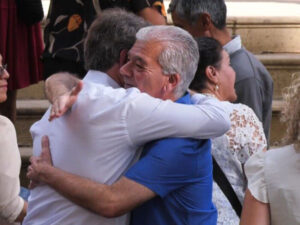Everything passes, everything changes
Everything passes, everything changes

“Everything passes”, said Tereza d’Avila back in the Renaissance. “Everything gets transformed”, said Lavoisier in the XVIII century, referring to events in nature. Philosophers and thinkers alike do not only state that things pass, things change. They state everything passes, that everything changes. And also everything moves!
Brazilian writer Monteiro Lobato used to quote, through one of the characters of his “Sítio do Picapau Amarelo”, a French saying which said: Tout passé, tout casse, tout lasse – everything passes, everything breaks, everything gets worn out.
This idea, however, is not totally obvious to the common sense. There are things which to our physical senses seem to be always the same, that look stable and still. For example, that the ground under our feet is always moving is not something obvious. In the Renaissance, Galileo was forced to deny his finding that the Earth rotates continuously. But he reaffirmed “eppur si muove!”, softly, so that the Inquisition might not hear him. Nowadays scientists know that everything in the sky is in constant movement. And, also, that in our body the cells not only are renewed continuously but that inside of them the molecules, the atoms are moving as well. Everything is subject to movement. Nothing stays still!
Movement and change are part of life, they are a necessity – something accepted even by common sense. Who doesn’t agree with the popular saying “still waters breed mosquitoes”. This saying reaffirms a thought which was already present in an ancient Greek proverb, collected by Erasmo of Rotterdam, who lived between the XV and the XVI centuries: “a rolling stone gathers no moss”.

Philosophy and western literature are in debt to the great humanist Erasmo, for having transmitted to the lights of the Renaissance the classical Greek and Roman texts. For example, the works of Heraclitus, who in the Western Literature was the first to talk about change and the non-permanence of all things.Heraclitus of Ephesus, the philosopher who had his apogee around 500 years B.C., affirmed that the world is in a permanent state of flux (panta rhei) and that all matter is subject to constant and inexorable change.
“Everything flows and nothing remains”, taught Heraclitus. “Everything withdraws and nothing stays still…”. “Nobody bathes twice in the same river, for other and other waters are continuously flowing.”
Heraclitus attributed the origin of all things to fire. He said: “The world is like the flame of a candle: always appearing to be the same, but always changing in substance.”
Virgilius, who lived in the 1st century B.C. and is regarded as the greatest among all Latin poets spoke about the transience of time. Virgilius is credited with the authorship of an expression which is on our lips all the time: “Time flies, flies with no return”.
Horatio, a slightly younger contemporary who was also a Roman poet, so fully agreed with this that he proclaimed the Carpe Diem, advising a friend to seize the day:
“Be wise, pour the wine…
And check your long hopes to this brief moment.
For while we talk, precious time passes us by.
Seize the day with as little faith in the future as possible.”
Plato, who lived from 428 to 348 B.C., also wrote about the transitory nature of all things and on the single permanence of ideas. Socrates brought up the notion of immutable and eternal forms, permanent and original realities from which we build imperfect and perishable copies in this world. This is the theme of the famous Allegory of the Cave – which conveniently comes to remind us how much we owe to Erasmo for having rescued these classical texts exactly at a time when the printing press was being invented.
Thanks to zealous guardians, these works have survived systematic destruction due to intolerance, tyranny and insanity which have marked the savage centuries of our history. It is admirable that they have reached our present times in which electronic reproduction makes them accessible to everyone.
The Inquisition flames have been put out and the intolerants and vandals of all times who destroyed formidable repositories of knowledge and culture like the Library of Alexandria have also passed. The tyrannies passed and are to pass – since after all, everything passes. But the knowledge of the indispensable truths, the great ideas, the concepts of immutability, the absolute and eternity remain among us, despite the inexorable flow of time.

Words like the prayer Saint Tereza kept in her prayer book, five centuries ago, still transmit peace and serenity to all of those who, amidst the restless turbulence of this fugitive world, still strive for them, like rolling stones upon which mud could not hide the brilliance of hope.
“Let nothing disturb you;
let nothing frighten you;
everything passes; God does not change,
patience accomplishes all.
He who has God, lacks nothing.
God alone is enough.”









